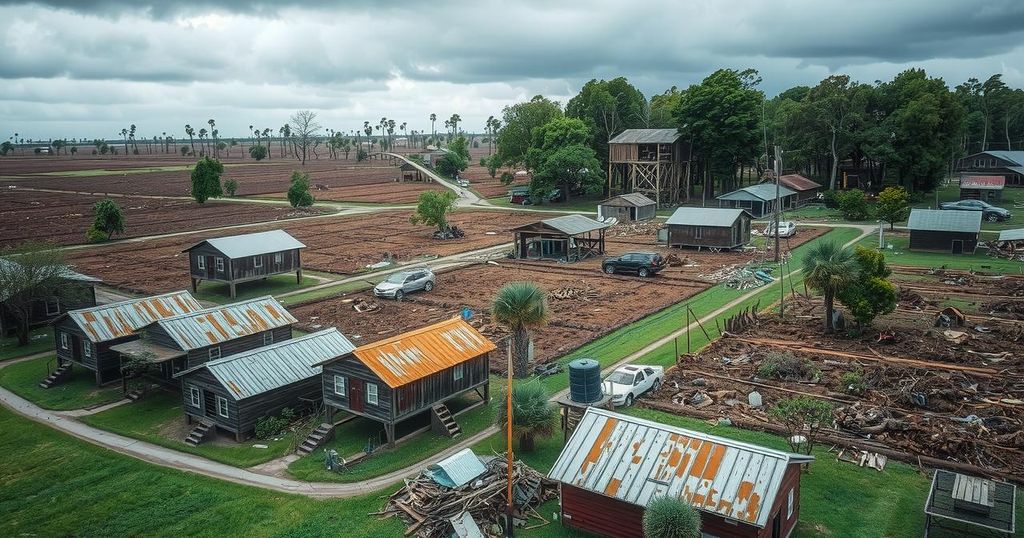Farmers Struggle with Hurricane Helene’s Lingering Impact on Agriculture
Months after Hurricane Helene devastated crops in the South, farmers like Chris Hopkins are still struggling to cope with extensive losses. Damage estimates exceed $10 billion across various agricultural sectors, with significant losses reported in cotton and poultry. Recovery efforts are underway, but financial strains and emotional tolls on farmers persist, leading to concerns about the sustainability of their operations moving forward.
Farmers across the South continue to grapple with the aftermath of Hurricane Helene, which unleashed devastation on agricultural lands months ago. In Lyons, Georgia, Chris Hopkins’ farm remains littered with damaged equipment, broken irrigation systems, and wrecked grain bins well past the storm’s September 26 landfall. Experts estimate that the financial toll on agriculture, timber, and agribusiness from Florida to Virginia will exceed $10 billion due to significant crop losses and infrastructural damage.
Helene’s impact was particularly acute for cotton growers like Hopkins, who lost half of his 1,400-acre yield during the critical fall harvest period. He expressed the emotional toll this disaster has taken, contemplating whether to rebuild or abandon his farming endeavors. The storm’s destruction, notably to crops, timber, and poultry houses, has far-reaching consequences across states, with Georgia alone assessing losses of approximately $560 million.
Local and federal efforts are underway to address the destruction, with Georgia’s governor reallocating emergency funds to aid farmers. The constitution in Georgia limits direct disaster aid, prompting calls for additional federal assistance. Farmers such as Jeffrey Pridgen, who operated large poultry houses before their destruction in Helene, now face daunting recovery challenges, including rebuilding costs that may not be fully covered by insurance.
Despite these widespread agricultural losses, experts note that consumer prices may remain stable, as production from unaffected regions could compensate for shortages. However, the existential question looms over many farmers, with some losing everything not just financially but also in terms of their future in agriculture.
Hurricane Helene struck the southeastern United States on September 26, 2024, causing extensive damage to agricultural sectors across multiple states. As a Category 4 storm, it made landfall in Florida before traversing northward, impacting regions in Georgia and beyond. The direct effects included catastrophic destruction of crops, timber, and farm infrastructure, leading to an estimated economic loss of over $10 billion. The storm highlighted the vulnerability of agricultural operations, particularly during peak harvest times, revealing the emotional and financial challenges faced by farmers.
In conclusion, the repercussions of Hurricane Helene are profound and ongoing for many farmers in the South, particularly in Georgia, where significant losses have been documented. Although efforts are being made at both state and federal levels to provide aid, the emotional and financial strain on agricultural producers remains substantial. As they navigate recovery, the resilience and adaptability of these farmers will be tested, with the looming potential for long-term impacts on their livelihoods and local economies.
Original Source: mynorthwest.com




Post Comment